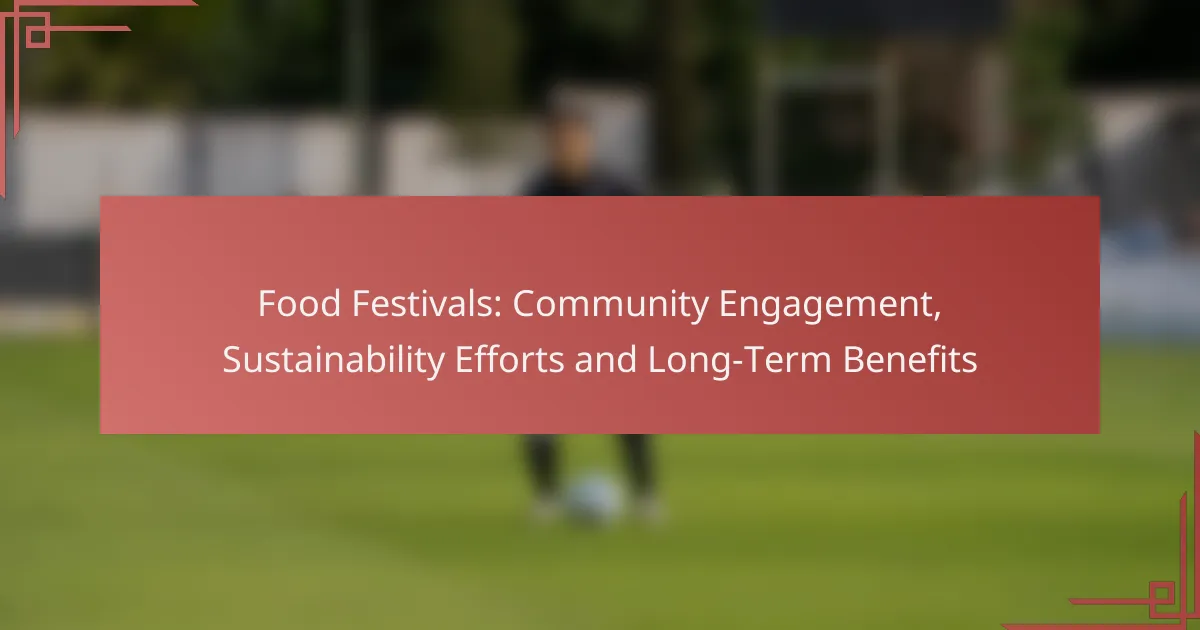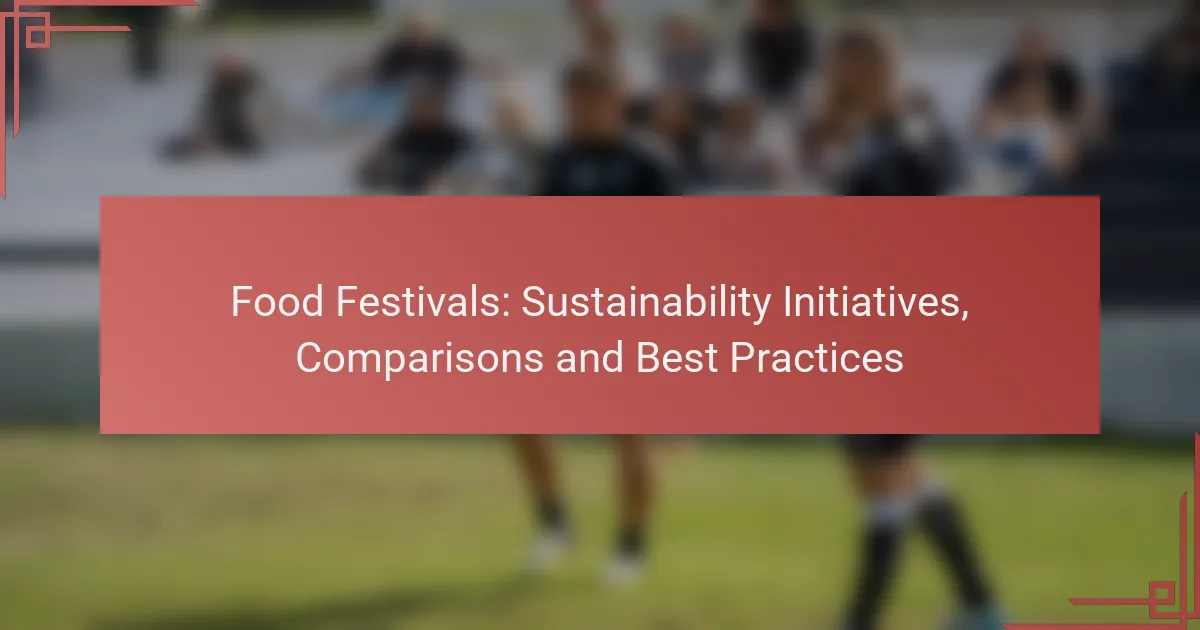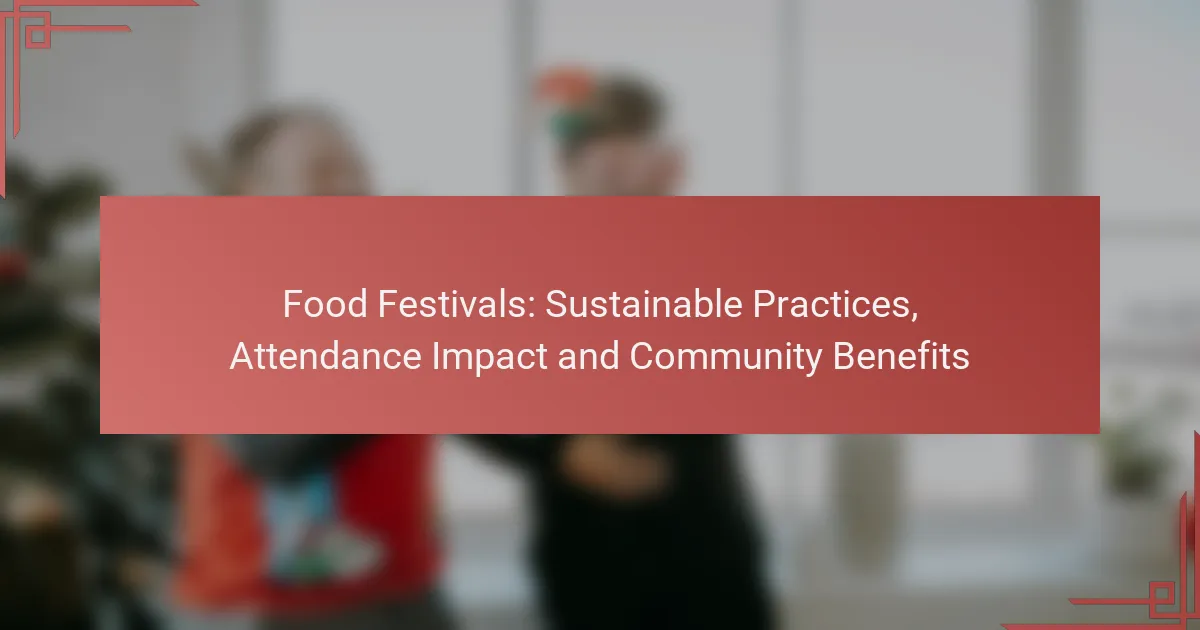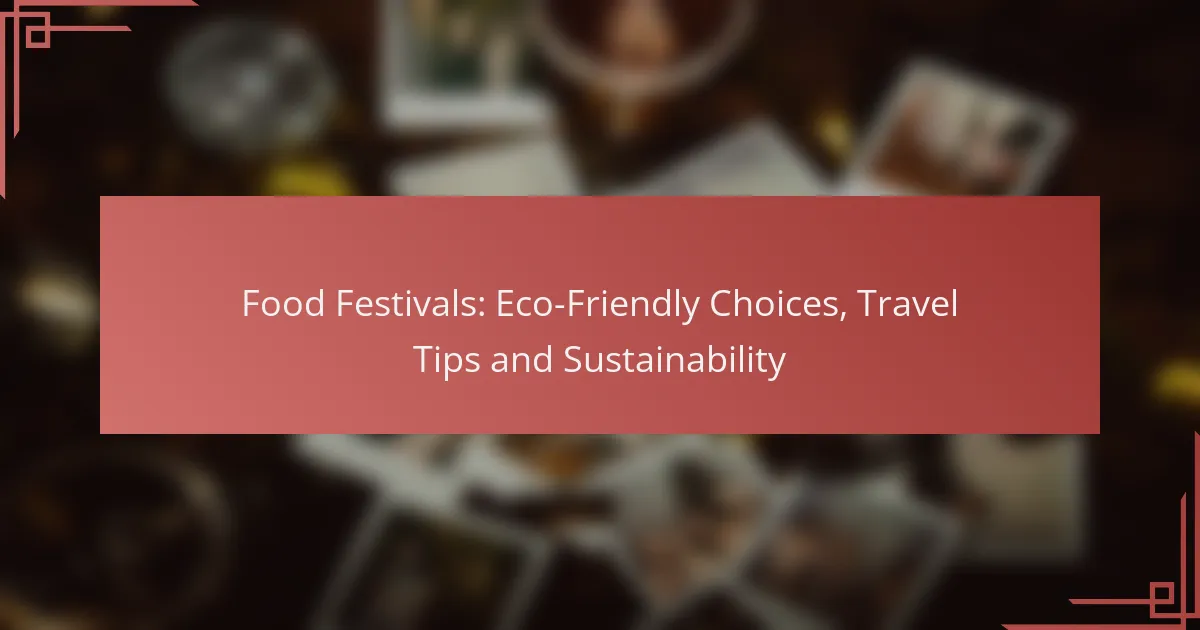Food festivals serve as vibrant hubs for community engagement, uniting local residents, businesses, and organizations to celebrate culinary diversity and foster connections. By implementing sustainability efforts, these events not only minimize environmental impact but also enhance local culture and pride. Ultimately, food festivals contribute to long-term benefits such as economic growth and strengthened local food systems, enriching the community for years to come.
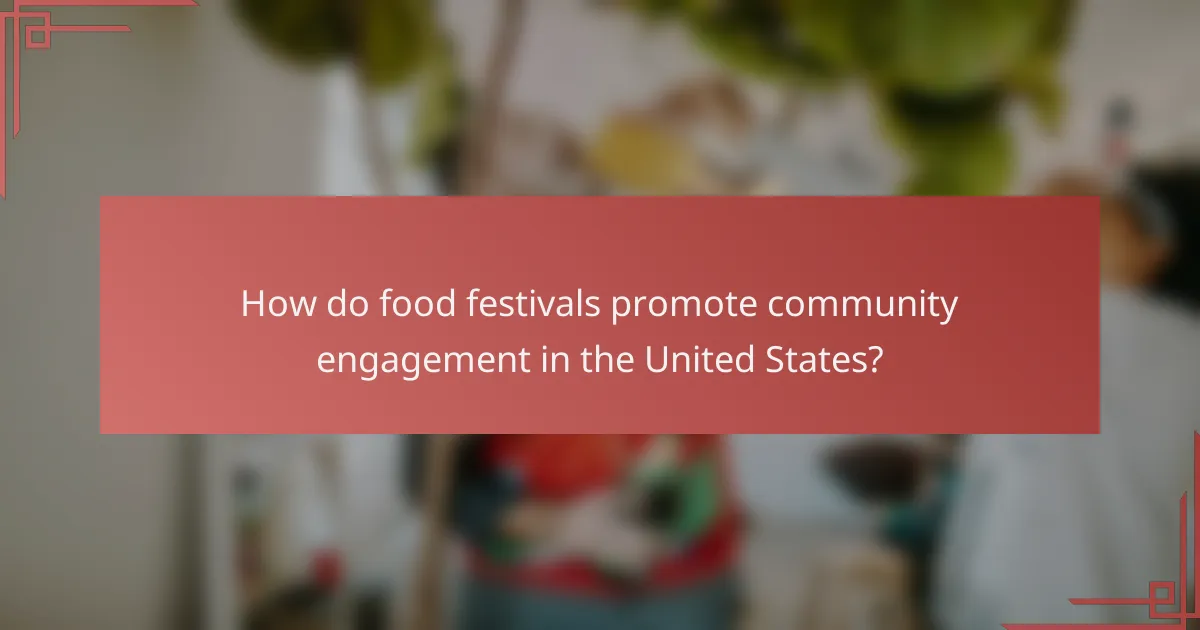
How do food festivals promote community engagement in the United States?
Food festivals in the United States foster community engagement by bringing together local residents, businesses, and organizations to celebrate culinary diversity. These events create opportunities for interaction, collaboration, and shared experiences, strengthening community ties and promoting local culture.
Local vendor participation
Local vendor participation is crucial for food festivals as it showcases regional cuisine and supports small businesses. Vendors often include farmers, artisans, and food producers who contribute unique products, enhancing the festival’s appeal. This participation not only boosts sales for vendors but also encourages attendees to support local economies.
For example, a festival might feature a variety of food trucks and stalls representing different cultural backgrounds, allowing attendees to explore diverse flavors while connecting with the community’s culinary heritage.
Community workshops and activities
Community workshops and activities at food festivals provide hands-on learning experiences that engage attendees. These can range from cooking demonstrations to food preservation classes, allowing participants to gain new skills and knowledge. Such activities often emphasize sustainability, teaching attendees how to reduce food waste or grow their own produce.
For instance, a festival might offer a workshop on making homemade jams, where participants learn about local fruits and sustainable practices, fostering a sense of connection to their food sources.
Volunteer opportunities
Food festivals often rely on volunteers, creating opportunities for community members to get involved and contribute. Volunteering can range from helping with setup and cleanup to assisting vendors and managing activities. This involvement not only helps the festival run smoothly but also fosters a sense of ownership and pride among volunteers.
Many festivals provide incentives for volunteers, such as free admission, meals, or merchandise, making it an appealing way for individuals to engage with their community while enjoying the event.
Networking for local businesses
Networking opportunities at food festivals allow local businesses to connect with each other and potential customers. These events often feature business expos or meet-and-greet sessions where entrepreneurs can share ideas, collaborate, and form partnerships. This networking can lead to increased visibility and customer loyalty for participating businesses.
Additionally, festivals can serve as a platform for local businesses to promote their products and services, helping them reach a broader audience while reinforcing community ties.
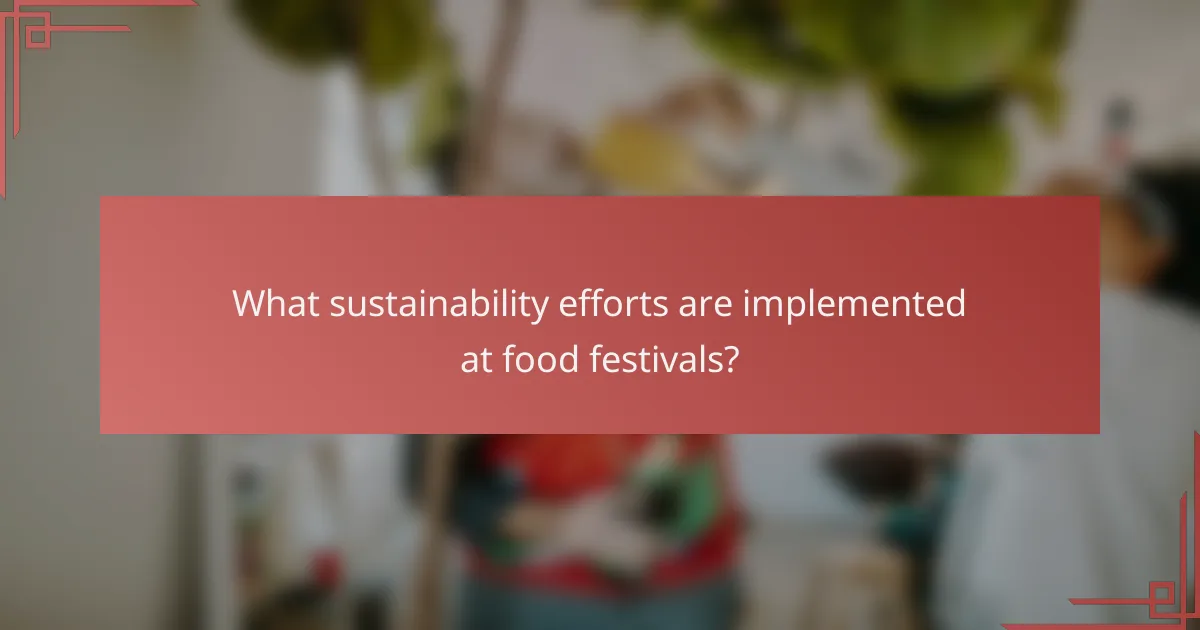
What sustainability efforts are implemented at food festivals?
Food festivals often implement various sustainability efforts to minimize their environmental impact and promote community engagement. These initiatives focus on reducing waste, sourcing ingredients locally, and enhancing recycling and composting practices.
Zero waste initiatives
Zero waste initiatives at food festivals aim to divert as much waste as possible from landfills. This often includes strategies like providing reusable utensils and containers, encouraging vendors to minimize packaging, and setting up designated waste stations for recycling and composting.
Festivals may also partner with organizations that specialize in waste management to track and report on waste reduction efforts. Engaging attendees through educational campaigns about waste reduction can further enhance these initiatives.
Local sourcing of ingredients
Local sourcing of ingredients is a key sustainability effort that supports regional farmers and reduces the carbon footprint associated with transportation. Many food festivals prioritize vendors who use locally grown produce, meats, and dairy products, fostering a sense of community and promoting the local economy.
By sourcing ingredients within a certain radius, typically 100 miles, festivals can ensure freshness and quality while also highlighting the unique flavors of the region. This practice not only benefits local producers but also educates attendees about the importance of supporting local agriculture.
Recycling and composting programs
Recycling and composting programs are essential components of sustainability efforts at food festivals. These programs help manage waste effectively by ensuring that recyclable materials and organic waste are properly processed. Festivals often provide clear signage and bins to guide attendees in disposing of their waste correctly.
Implementing a composting program can significantly reduce the amount of organic waste generated, with many festivals achieving composting rates of 30-50%. Collaborating with local composting facilities can streamline this process and enhance the festival’s overall sustainability profile.
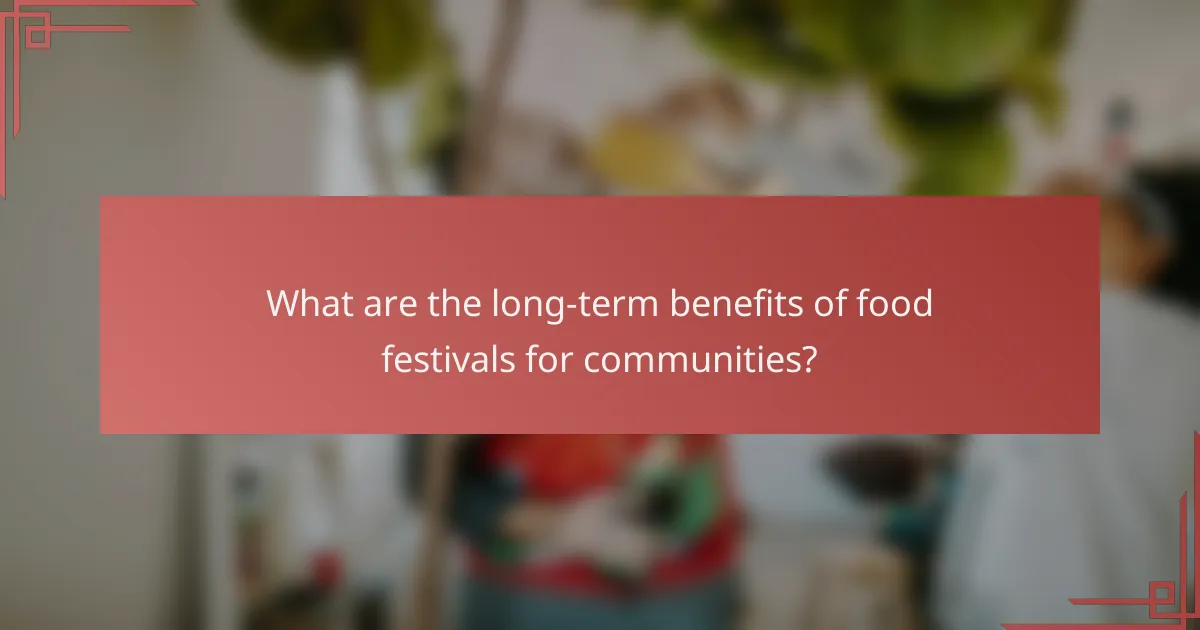
What are the long-term benefits of food festivals for communities?
Food festivals provide numerous long-term benefits for communities, including economic growth, strengthened local food systems, and enhanced cultural exchange. These events foster connections among residents and visitors, promoting sustainability and community pride.
Economic growth through tourism
Food festivals attract tourists, which can significantly boost local economies. Communities often see increased spending in restaurants, hotels, and shops during these events, leading to job creation and higher revenue for local businesses.
For example, a small town hosting a food festival might experience a surge in visitors, resulting in a revenue increase of 20-30% for local establishments over the festival weekend. This influx can help sustain businesses year-round.
Strengthening local food systems
Food festivals promote local agriculture by connecting farmers directly with consumers. This relationship encourages the consumption of locally sourced produce, which supports farmers and reduces transportation emissions.
Communities can benefit from initiatives like farm-to-table programs showcased at festivals, where local chefs highlight seasonal ingredients. Such practices not only enhance food quality but also foster a sense of community and shared responsibility for sustainable practices.
Enhanced cultural exchange
Food festivals serve as platforms for cultural exchange, allowing diverse communities to share their culinary traditions. This interaction fosters understanding and appreciation among different cultural groups, enriching the local social fabric.
For instance, a festival featuring international cuisines can introduce attendees to new flavors and cooking techniques, promoting dialogue and collaboration among chefs and food enthusiasts. This cultural sharing can lead to lasting relationships and community cohesion.
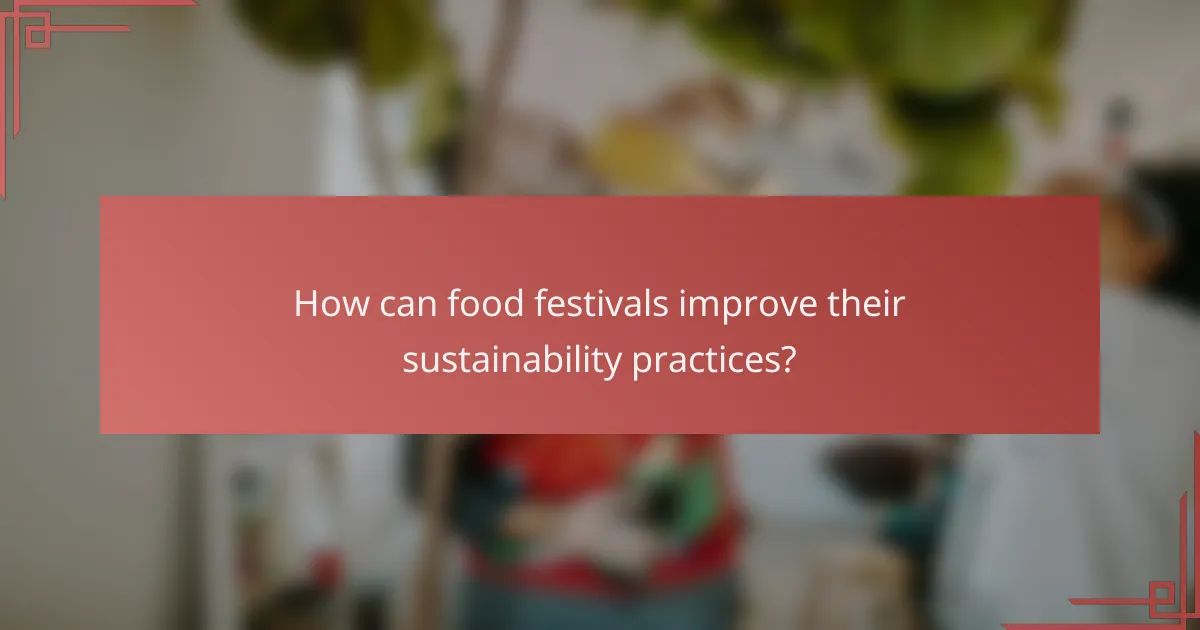
How can food festivals improve their sustainability practices?
Food festivals can enhance their sustainability practices by focusing on reducing waste, minimizing carbon footprints, and promoting local sourcing. Implementing eco-friendly initiatives not only benefits the environment but also engages the community and attracts environmentally conscious attendees.
Adopting eco-friendly packaging
Using eco-friendly packaging is a crucial step for food festivals aiming to reduce waste. Options include biodegradable containers, compostable utensils, and reusable bags. Festivals can encourage vendors to switch to these materials by providing incentives or subsidies.
Additionally, festivals can implement a “bring your own container” policy, where attendees are encouraged to bring their own reusable items. This not only cuts down on single-use plastics but also fosters a culture of sustainability among participants.
Implementing carbon offset programs
Carbon offset programs allow food festivals to counterbalance their greenhouse gas emissions by investing in environmental projects. These can include reforestation efforts, renewable energy initiatives, or community-based sustainability projects. By calculating the festival’s carbon footprint, organizers can determine the necessary offset investment.
Festivals can partner with local environmental organizations to create a transparent and effective offset program. This collaboration not only enhances credibility but also engages the community in sustainability efforts, making attendees feel more connected to the cause.

What role do food festivals play in promoting local cuisine?
Food festivals play a crucial role in promoting local cuisine by providing a platform for regional dishes to be showcased and celebrated. These events not only highlight the unique flavors and ingredients of a locality but also foster community pride and engagement around culinary traditions.
Showcasing regional dishes
Food festivals allow local chefs and home cooks to present traditional dishes that reflect the area’s culinary heritage. Attendees can sample a variety of foods, from street vendors serving quick bites to sit-down meals featuring family recipes. This exposure helps preserve local flavors and encourages the use of regional ingredients.
For example, a festival in Italy might feature pasta made from locally sourced grains, while a festival in Mexico could highlight dishes made with indigenous ingredients like corn and beans. Such events create an opportunity for visitors to experience authentic local cuisine, which can lead to increased interest in these dishes beyond the festival itself.
Highlighting local chefs and restaurants
Food festivals serve as a spotlight for local chefs and restaurants, allowing them to gain visibility and attract new customers. Chefs can showcase their signature dishes, engage with festival-goers, and share their culinary stories, which helps build a connection between them and the community.
Participating in a food festival can be a strategic move for restaurants, especially small or emerging ones, as it provides a chance to reach a wider audience without the overhead of a traditional marketing campaign. Additionally, collaborations between chefs can lead to innovative dishes that further enhance the local culinary scene.

How can technology enhance food festival experiences?
Technology can significantly enhance food festival experiences by improving attendee engagement and streamlining operations. From mobile apps that provide real-time information to cashless payment systems, tech solutions create a more enjoyable and efficient environment for both visitors and vendors.
Mobile Apps for Engagement
Mobile applications can serve as a central hub for festival information, offering schedules, maps, and vendor details. Attendees can receive notifications about special events, food tastings, or live performances, ensuring they don’t miss out on key experiences.
Additionally, apps can facilitate social interaction by allowing users to share their experiences, post photos, and connect with other festival-goers. This enhances community engagement and fosters a sense of belonging among participants.
Cashless Payment Systems
Implementing cashless payment systems can streamline transactions at food festivals, reducing wait times and improving the overall experience. Attendees can use mobile wallets or festival-specific cards to make quick purchases, which can enhance vendor sales and customer satisfaction.
Moreover, cashless systems can provide valuable data analytics for organizers, helping them understand spending patterns and optimize vendor offerings for future events.
Social Media Integration
Integrating social media into food festivals allows for real-time sharing and promotion, increasing visibility and attracting more attendees. Hashtags can be created for the event, encouraging visitors to post their experiences and engage with the festival’s online community.
Organizers can also use social media to gather feedback and insights, helping them improve future festivals based on attendee preferences and suggestions.
Virtual and Augmented Reality Experiences
Virtual and augmented reality can create immersive experiences that enhance the festival atmosphere. For instance, AR can be used to provide interactive menus or cooking demonstrations, allowing attendees to visualize dishes before ordering.
These technologies can also be employed for educational purposes, such as showcasing sustainable farming practices or food preparation techniques, thereby enriching the overall festival experience.
